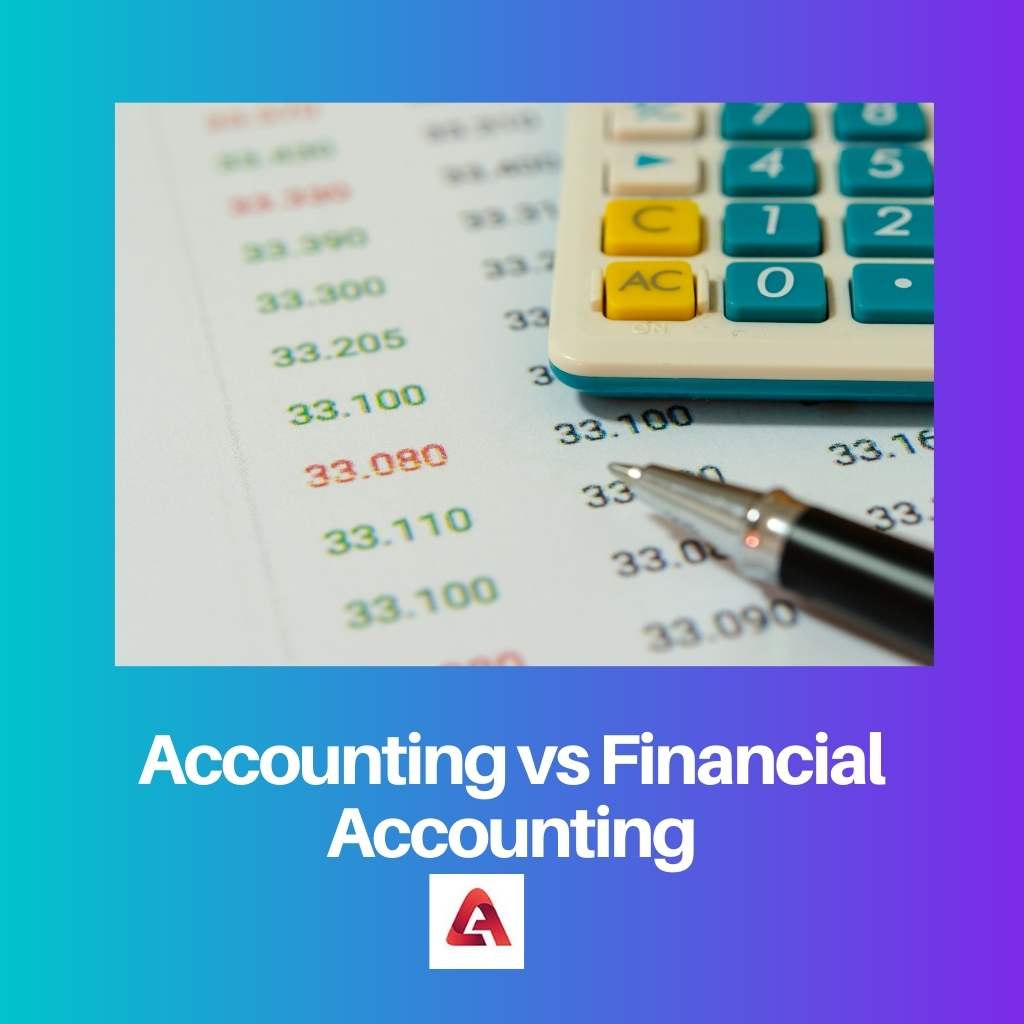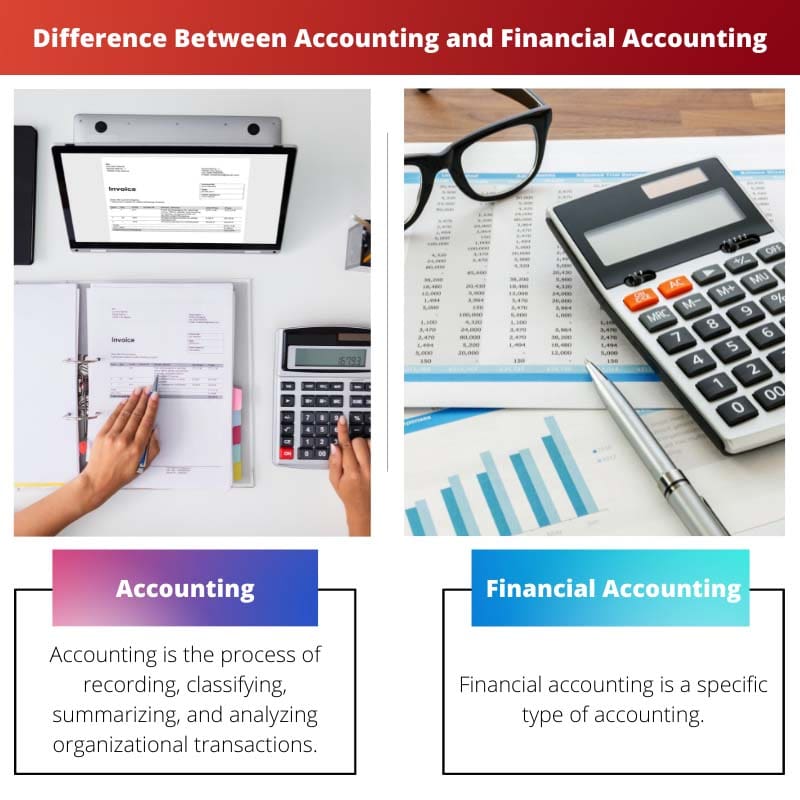Proper accounting and financial accounting methods are crucial for the running of a successful business. A single mistake in the process can make or break the deal.
Since both accounting and financial accounting revolve around the same concepts, they can be confused with one another. However, they have quite a few differences between them.
Key Takeaways
- Accounting encompasses a broad range of financial record-keeping activities, while financial accounting focuses on preparing financial statements.
- Financial accounting follows standardized guidelines, such as GAAP or IFRS, whereas accounting may include non-standardized practices.
- Financial accounting targets external stakeholders, while accounting serves internal and external users.
Accounting vs Financial Accounting
Accounting is the process of recording, classifying, and summarizing financial transactions for an individual or organization. Financial accounting has a specific focus on preparing financial statements, such as balance sheets and income statements, used for external reporting to stakeholders.

Accounting is the process of recording, classifying, summarizing, and analysing all the transactions that are carried out in an organization.
These transactions can either be carried out internally among people working in the organization or externally. Moreover, the accounting process includes all transactions, even those which are not monetary.
Financial accounting is a very specific kind of accounting and has equal importance in a business. The methodology is the same as accounting, which involves recording, summarizing, and so on.
However, financial accounting only deals with external transactions which are monetary in nature. This means that it deals with the exchanges that take place with people outside the organization.
Comparison Table
| Parameters of Comparison | Accounting | Financial Accounting |
|---|---|---|
| Meaning | Accounting is the process of recording, classifying, summarizing, and analyzing organizational transactions. | Financial accounting is a specific type of accounting. |
| Objective | The objective of accounting is to prepare statements for all the transactions that take place. | Financial accounting processes are carried out in order to prepare financial statements. |
| Nature of Transactions | The transactions can either be monetary or non-monetary. | Financial accounting only deals with monetary transactions. |
| Scope of Transactions | The transactions that are recorded may be internal or external. | Financial accounting only deals with external transactions with other individuals or organizations. |
| Training | Programs that grant degrees in accounting tend to train accountants in a general way. | As compared to accounting, the training for a financial accounting degree is more specific and specialized. |
What is Accounting?
Accounting is a process carried out by business organizations to measure, organize, and get a better understanding of all the transactions that occur. It involves recording, summarizing, classifying, and analysing accounting data.
This data includes transactions that can be monetary or non-monetary in nature. Moreover, the transactions can take place within the organization as well as outside it.
There are various theories and hypotheses that accountants use to carry out this process. However, in general, the work begins when the accountant must collect data such as invoices, bank statements, and even billing receipts.
Based on this data, the accountant creates a journal where all the information is recorded. Next, a balance sheet is prepared when the period of reporting comes to an end.
A balance sheet is prepared to check the position of assets and liabilities that a company owns. This helps understand where the organization stands financially and helps decide plans of action for the future.
Lastly, after creating a balance sheet, the journal entries and asset-liability observations are adjusted for rectifications and updates.
Once everything is prepared and checked, the accountant prepares a final statement that provides all the necessary information regarding this aspect of the business.
Based on this statement, the company can decide where to allocate resources and when to curb its expenses. It can also give insights on how to manage income in the most beneficial way.

What is Financial Accounting?
Financial accounting is a specific type of accounting that involves measuring, organizing, and understanding an organization’s work.
This is done by reporting and assessing the financial transactions that occur during the business that happens over a certain period of time.
Only external transactions that happen with entities outside the organization are considered in financial accounting statements.
A financial statement is something that an accountant creates at the last phase of the process. In this, all the monetary transactions that the organization has been a part of are recorded.
This also includes balance sheets, cash flow statements, and even income statements. All of these help organize the data regarding what word an organization has done over a specific time period.
Financial accounting is a sub-part of the overall accounting process of an organization. This process is carried out by expert financial accountants who follow a set of accounting principles.
These principles are laid down by the apex body, which sets specific standards for recording and interpreting data. This also helps provide consistent and correct information for different people to follow.
Under financial accounting, the data is divided into five main classifications. These include assets, liabilities, expenses, revenue, and equity.
Using these, an accountant performs certain calculations to come up with the net income. For this, the assets, liabilities, and equity are taken into consideration while making a balance sheet.

Main Differences Between Accounting and Financial Accounting
- Accounting is the overall process of measuring, recording, and interpreting the transactions of an organization, while financial accounting is a specific kind of accounting.
- Accounting aims at assessing the overall transactions of an organization, while financial accounting only deals with financial transactions.
- Transactions in accounting can be monetary or non-monetary, while transactions in financial accounting are always monetary.
- Accounting deals with external as well as internal transactions, while financial accounting deals only with external transactions.
- Training for accountants is not as specialized as the training for financial accountants.




